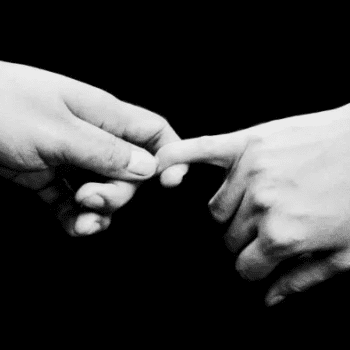 On my Facebook page just now we’ve been having a little fun about how, in an Easter morning editorial run in the Durham, NC newspaper The Herald-Sun (Good from evil), I was referred to as a Christian apologist.
On my Facebook page just now we’ve been having a little fun about how, in an Easter morning editorial run in the Durham, NC newspaper The Herald-Sun (Good from evil), I was referred to as a Christian apologist.
So I thought I might take a moment to be clear: I am, definitely and flat-out, a Christian apologist.
About two months after very suddenly and out of freakin’ nowhere becoming a Christian, I—one evening while putting away the dishes after dinner—basically snapped into some kind of trance. Three months later I had finished the first real thing I ever wrote as a Christian, which was “Penguins, Pain & the Whole Shebang: Why I Do the Things I Do,” by John Shore (as told to God).
That book is most definitely a Christian apologetic. That’s how, book-business-wise, it’s categorized. (Actually, publishers and bookstore people had a seriously hard time categorizing Penguins: was it humor? Religion? Theology? Christian Living? I think it truly might be the only book ever published that actually kept raising the question: “Is it fiction, or non-fiction?” Marketing people felt very uncomfortable with it. “We love this book,” major publishers kept telling my agent, “but we have no idea how to market it. And we’re really afraid it will piss off Christians—whom, we have learned, we do not want to piss off.” You wouldn’t believe how often we heard that exact same thing. It was a trip.)
After suddenly finding myself a Christian (some of you might remember when this blog was called Suddenly Christian), I wanted to have in my possession something short and funny (read: readable) that I could give to my non-Christians friends and associates by way of proving that just because you’re a Christian doesn’t automatically mean that you’re insane (not to mention a homophobic, misogynistic, fear-based, emotionally retarded dink).
So I wrote Penguins, because there was nothing out there like it. (Except then there was, because a Christian publisher involved with the book at its initial stages flat-out stole it from me, and had a much-more-famous than I Christian author write a heavily-marketed, painfully bad imitation of it. And suddenly I became a wanna-be around a book that was, in fact, mine. But that happens. More than I can tell you.)
Before I became a Christian, I pretty wholly despised Christianity—insofar as I cared about it at all, which I didn’t. Safe to say that I had less than a lot of respect for the Christian belief system. So after my Bizzaro Conversion Experience, I became really interested in answering exactly those questions that I knew were legitimate, rational, and sane complaints against Christianity—the same complaints I knew I’d always had about it, which no Christian ever seemed capable of satisfactorily answering.
So—in that weird, not-really-at-all-pleasant state you sometimes get into where you feel like you’re really just a vehicle for some creative drive way beyond yourself—I wrote Penguins, in which God himself (and please rest assured that, trance or not, that was but a literary device) answers nine or ten of the most primary of such questions. Thus does Penguins contain such chapter headings as:
- If you really exist, why don’t you prove it?
- What’s the deal with evil, anyway? Why does a God who is all-powerful an all-compassionate allow evil to exist? He either wills evil to exit—which makes him despicable—or he’s powerless to stop it, which makes him uninspiringly weak, to say the least. Both bite. What’s up?
- Why are so many Christians so obnoxious and mean-spririted? It seems like Christianity’s mostly about being judgmental, narrow-minded, and having an infuriatingly condescending attitude toward anyone who isn’t a Christian. Christians are so busy being smug about being Christian they forget to be kind.
- What’s that whole “Atonement” thing actually mean?
- Isn’t it enough that I believe in God? Why do I have to narrow it down to the Christian God?
- What’s the deal about God actually writing the Bible? Is it written by God, or people, or people filled with the Holy Spirit, which is somehow supposed to be the same as God, or what? What’s the Scoop, Jackson? (The first thing God answers to this one is, “Did you just call me ‘Jackson’?”)
- Even if I do believe in Christ, do I really have to go to church every Sunday? Yuck.
- So how would being a Christian actually improve my life? What would it really do for me?
and so on. (There’s actually a lot more to Penguins than just those chapters. And the book is still so short you can read it one sitting. For what it’s worth, I know I’ll never write a better book.)
Christian apologetics is pretty much what I do. In some ways the 16-point tenets of the group now called Unfundamentalist Christians is my most comprehensive apologetic statement. I’m OK–You’re Not: The Message We’re Sending Nonbelievers and Why We Should Stop is an apologetic, insofar as it presents and defends a version of Christianity that … I felt needed presenting and defending.
All my work on the LGBTQ/Christians issue is essentially apologetics: I’m trying to show why the version of Christianity in which I believe is every bit as intellectually, theologically, and spiritually legitimate as that Christianity which today we tend to consider “traditional.” Same with the work that went into my short e-book, Hell No! Extinguishing Christian Hellfire.
I believe in Christianity. I love Christianity. But I take great exception to the version of Christianity that today most people think of when they think of Christianity. I know a better Christianity. I know a Christianity that’s logically unassailable. I know a Christianity that understands the difference between God’s love and man’s hate. And until the day I drop dead I’m going to work to bring that Christianity into the mainstream. I feel morally obliged, frankly, to do everything I can to help resurrect the Christianity I know from the ashes of what Christianity has become.












